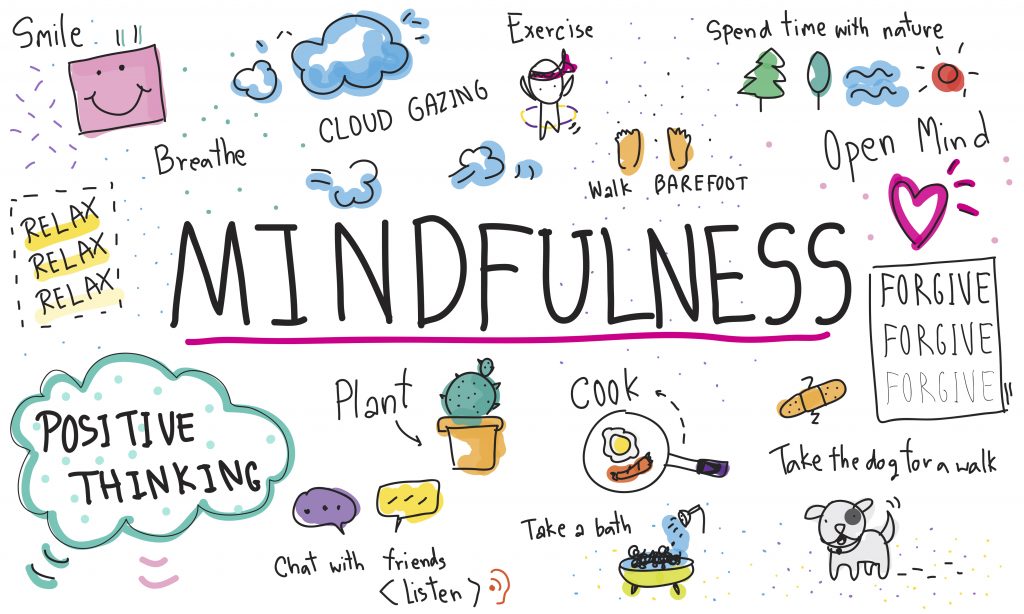Mindfulness in recovery puts you back in control of your life and actions.
Mindfulness is a meditation tool that helps you to become grounded in the present moment. Mindfulness in recovery is the key to breaking old habits and forming new ones. Is it hard to do? No, it’s fun once you know how. This form of meditation encourages you to use your senses, engage with your surroundings, and recognize what you’re thinking and feeling in the present moment.
Practicing mindfulness in addiction recovery can help you to become more empowered and more in control of your recovery process by decreasing physical and mental symptoms of mental health issues, such as depression or anxiety. In short you feel better when you think enjoyable thoughts.
If you or someone you love have just begun recovery from substance abuse or are looking for a new way to approach recovery, mindfulness may be the right option. First, let’s discuss a few of the basics of mindfulness.
What Is Mindfulness?
Mindfulness is the act of being fully aware and present. It might be practiced in a meditation session or throughout the day as needed. Because mindfulness is so versatile, you can use it in your recovery process in the way it will help you most.
For example, as you’re driving to work, you might take the 10-minute drive to practice deep breathing, tune into your surroundings, and ground yourself in the moment.
Here are a few ways to practice mindfulness:
- Practice breathing exercises
- Find a mindfulness meditation guided session
- Focus on accepting and appreciating yourself
- Speak words of gratitude and affirmation
- Be present and purposeful
- Stretching
Here’s how you can put mindfulness in recovery into practice:
- Use your senses: Smell what’s in the air, feel the items around you, listen to your surroundings, and look at what’s in front of you.
- Do a body scan: Sit or lie down and bring your attention slowly to each part of your body, feeling the weight of your body sink into the surface beneath you.
- Practice walking meditation: Walk slowly and with purpose for a set period (maybe 10 to 20 minutes), bringing awareness to your body, movements, and sensations.
Now, let’s explore the benefits of mindfulness in addiction recovery below so you can decide whether this is a meditation practice you’re ready to try out.
1. Positive Emotions
Experts have found that people in addiction recovery who practice mindfulness-based therapies have significantly better outcomes than their peers who did not participate in these therapies. In fact, mindfulness was found to decrease stress (one of the biggest factors in cravings, relapse, and triggers), lower symptoms of co-occurring mental illness, and increase positive emotions.
This is because mindfulness takes your mind off of the negative, intrusive thoughts and refocuses your attention to your body and surroundings. The more in tune you become with your emotional state, the better you can control impulses, emotional reactions, thoughts, and behaviors.
2. Mindfulness In Recovery Helps Regulate Your Emotions
The above study also found that people in addiction recovery who practiced mindfulness expressed positive emotion regulation. They did this by amplifying selective attentional processes. For example, people who put mindfulness into practice while eating found that they enjoyed their food more; those who practiced mindfulness over a longer term (eight weeks) found greater enjoyment from pleasant daily life activities.
Becoming aware of your thoughts, feelings, sensations, and more help you to better regulate your emotional state and focus more on the positive, enjoyable aspects of life in recovery. Especially during the early stages when withdrawal and cravings are strongest, it’s very important that you find ways to regulate these feelings and your responses to them.
3. Enhanced Self-Efficacy
Often in addiction counseling, addiction treatment practitioners will focus on self-efficacy, which is a person’s individual belief in their own abilities. During addiction, many people lack this self-efficacy, assuming that they’re bound for failure and relapse. They struggle to find purpose and belief in their own capability of achieving their goals.
With mindfulness, you’ll build a deeper connection with yourself, allowing you to focus on your personal goals and achievements. Researchers have found that for some people, mindfulness can boost self-efficacy, resulting in lower levels of stress, pain, and more. As you begin to understand more of your power and capabilities, you’ll be boldened to pursue recovery and resist triggers.
4. Reduced Cravings
Mindfulness helps people in substance use disorder recovery to self-regulate cravings. When a craving arises, you can 1. Acknowledge the craving and what brought it on, 2. Ground yourself in reality, and 3. Refocus your attention elsewhere.
Through mindfulness, those in recovery learn to consciously respond and adapt to the urge to use substances rather than automatically reacting to the craving by using again. Over time, you’ll find that the urge to use becomes less and less until you’re in full control over your cravings and substance use.
Using Mindfulness In Recovery to Overcome Addiction
If you deal with chronic pain, stress, depression, anxiety disorders, or another concern in addition to your addiction, mindfulness can help. This week, take a few of the practices mentioned above — stretching, deep breathing, taking purposeful walks — and discover how those simple changes can impact your recovery journey. If you have a loved one who’s currently overcoming a drug or alcohol addiction, offer to go through a few of the steps with them so they know they’re not alone.
More articles to read
How to combat anxiety with meditation






















